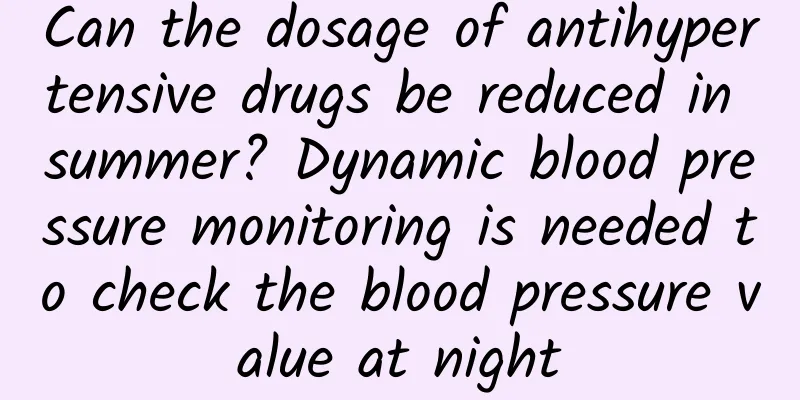Can the dosage of antihypertensive drugs be reduced in summer? Dynamic blood pressure monitoring is needed to check the blood pressure value at night

|
After entering the summer, many patients with hypertension asked Huazi, "When the weather gets hot, the blood pressure drops. Can the antihypertensive drug dosage be reduced or stopped?" Huazi said that the antihypertensive drug dosage can be reduced, but it is not recommended to stop taking it. When reducing the dosage, it is necessary to confirm that the blood pressure has indeed been stably reduced and there will be no rebound after the drug dosage is reduced. And there is another thing to note. Some people's blood pressure is lower during the day, but higher at night. Therefore, if you want to be foolproof when adjusting medications, you need to do 24-hour dynamic blood pressure monitoring. 1. Blood pressure decreases when the weather is hot The human body's blood pressure follows seasonal patterns, rising in cold weather and falling in hot weather. The reasons why blood pressure fluctuates with the seasons are mainly affected by two factors: 1. Direct influence of temperature: When the ambient temperature is high, surface blood vessels dilate, peripheral resistance decreases, and blood pressure decreases. 2. Water and sodium excretion function: When the ambient temperature is high, the human body needs to increase sweating to dissipate heat. In the process of sweating, a large amount of water will be consumed, reducing blood volume. Sodium ions will also be excreted during sweating, which reduces the sodium ion level in the human body, reduces the excitability of vascular smooth muscles, dilates blood vessels, and lowers blood pressure. 2. Blood pressure changes during the day and at night may be different Compared with the cold winter, the hot summer does lower blood pressure. The specific difference in blood pressure varies from person to person, usually 5 to 10 mmHg, and a few people may reach 20 mmHg. However, a related study published in the Journal of Hypertension found that the changes in daytime blood pressure and nighttime blood pressure in summer are inconsistent. Some people's daytime blood pressure drops in summer, but their nighttime blood pressure increases instead. Moreover, the phenomena of nighttime hypertension and morning hypertension are more common in summer than in winter. This may be the reason why people generally go to bed later in summer than in winter, have poor sleep quality, and increase the excitability of the sympathetic nervous system. 3. 24-hour dynamic blood pressure monitoring is recommended When blood pressure is continuously low in the summer, you can consider reducing the dosage of antihypertensive drugs. But before adjusting the medication, you need to determine your nighttime blood pressure value. It should be noted that the blood pressure value measured when you get up in the middle of the night is not an accurate nighttime blood pressure. Only blood pressure measured while sleeping can reflect the true nighttime blood pressure level. Therefore, Huazi recommends that patients with hypertension should undergo a 24-hour dynamic blood pressure monitoring before adjusting their medication. This can not only help them understand the true level of their blood pressure fluctuations, but also allow them to determine the specific time to take antihypertensive drugs based on the pattern of blood pressure fluctuations, in order to achieve better antihypertensive effects. 4. It is not recommended to adjust the dosage of antihypertensive drugs at will When taking antihypertensive drugs, it is not recommended to adjust the dosage at will unless there are serious adverse reactions or hypotension. Although blood pressure values in summer are slightly lower than those in winter, most hypertensive patients will not experience hypotension even if they take the same dosage as in winter. For patients with hypertension, lower blood pressure means better protection for the cardiovascular system. Therefore, it is recommended to adjust medication only when the blood pressure is too low (lower than 90/60 mmHg), or when obvious ischemic symptoms such as dizziness, black vision, palpitations, and chest tightness appear after the blood pressure is lowered. The adverse reactions of antihypertensive drugs mainly occur in the early stages of medication, so when adjusting the medication, it is not recommended to stop the medication completely. It is recommended to reduce it to the lowest dose to maintain it, which can reduce the adverse reactions that may occur when taking the medication again when the weather is cold. In summary, when the temperature rises in the summer, blood pressure will drop, but before adjusting the medication, you need to confirm whether your nighttime blood pressure is elevated. It is best to do a 24-hour dynamic blood pressure monitoring. If there are no symptoms of hypotension or ischemia, it is not recommended to reduce the dose of antihypertensive drugs at will. The safest approach is to adjust medication under the guidance of a doctor. I am pharmacist Huazi. Welcome to follow me and share more health knowledge. |
<<: Why do snail shells have different colors? Do snail shells grow with the snail?
>>: What are the feet of a snail called? What are the teeth of a snail called?
Recommend
Are Apple's retail stores in mainland China closed? Why is Apple closing its retail stores in mainland China?
When it comes to mobile phones, the first thing t...
Why are statins rarely used in high doses? Because of the "6 plus rule"
For people with atherosclerosis, statins are comm...
Methods for treating leucorrhea with odor
Between two menstrual periods, women will have le...
Can I have another medical abortion after multiple medical abortions?
Medical abortion is usually performed within 49 d...
How to get rid of cold during confinement
For women, childbirth is a very important matter ...
How to choose milk dates? Are green dates and milk dates the same?
Milk dates are rich in fructose and fiber, especi...
"The anus tightens!" It is embarrassing to talk about anal foreign bodies, which is much more serious than "shame".
In the Second Department of Anorectal Surgery of ...
What to do if girls have too much leg hair? How to remove leg hair
Having smooth and slender legs is the wish of eve...
What are the symptoms of ovulation and pregnancy?
We all know the symptom of ovulation and good pre...
International Acromegaly Awareness Day | Do people become "uglier" as they age? Swollen hands and feet, high blood pressure may be the reason...
As people age, they may notice that their cheekbo...
Can I use a facial mask when my period comes?
There are always a few days every month that wome...
What causes breast pain during lactation?
Breastfeeding women have a very hard time because...
What to do if your period is not on time
Menstruation is a natural phenomenon that every w...
Be careful to avoid this risk when eating seafood
You think that a "medical legend" is a ...
What nuts should pregnant women eat to improve the fetal brain development?
Dried fruits are fruits with shells on the outsid...







![Success is not enough [Exhibition of outstanding works of the 4th "Xibei Cup" National Rehabilitation and Physical Therapy Popular Science Competition (Graphic and Text Category)]](/upload/images/67f16fdcd3ee5.webp)

